Responding to Current Events at Church
How to properly address the hurts and struggles in the community
Father Michael White Comments Off on Responding to Current Events at Church
More than ever before, we experience major world events collectively. Raw footage and intensely personal stories of victims are immediately available to us through the news media. Local events and tragedies take on increased significance, too, in local communities where more and more is communicated over widely distributed social networks.
These major events are defined by their great impact on a community, nation or the entire world, sometimes in a sudden, unexpected or historic way. But the key element that makes a major event a defining moment is that it touches everyone, or most people in the community; it acts as a shared experience of struggle, grief or challenge.
These kinds of events dominate news coverage, act as the center of discussion and define our lives for some time. Recent examples include the COVID-19 pandemic, the protests surrounding the death of George Floyd, Hurricane Ida and, most recently, the tragic conflict in Ukraine. There are also local examples of this that might only extend to the borders of your parish, such as the tragic death of a young person or the passing of a beloved community leader, or even a pastor.
The question we struggle with here at our parish is how to respond to these defining moments. As pastors, and given the mere 60 minutes a week that we have people’s attention, how do we honor the liturgical season already established, attend to ordinary parish business and acknowledge critical current events? What is our objective in doing so, anyway?
The secondary challenge is that many of these major events are open to multiple interpretations by our parishioners. Political battle lines are drawn more quickly than ever before and make the parish’s job much harder.
Defining moments are substantial opportunities available to the church when we properly address the hurts and struggles that surround these events. During these events, suddenly, we have people’s attention, something that is not at all easy to lay hold of. In my time as a new pastor, I remember vividly being surprised at how my parish filled to the point of standing room only on the first weekend following 9/11. Even those unfamiliar with faith are perhaps more likely to give church a try in the face of bad news, and we then have an additional opportunity to demonstrate that the Church is not irrelevant to the rest of their lives. If we can direct that attention from pain to promise, from confusion to purpose, we have provided a real service.
Here are three steps you might want to consider when responding to major events:
Discern: Not all major events will need to be addressed the same way. Varying levels of impact mean that the response of the Church should vary, too. The least intrusive ways to acknowledge a major event could be on your website or social media pages. Some situations will warrant a stronger statement, which could include a petition in the universal prayer.
The strongest way to respond will always be by using the weekend homily. When COVID-19 caused the first series of lockdowns in March 2020, we scrapped our existing preaching plans and dedicated a series of homilies to directly addressing concerns, frustrations and worries of the parish in the context of the week’s readings.
Acknowledge the situation: Wherever you discern to mention the situation, it’s important to realize that acknowledgment alone is very powerful. It gives people space to grieve and demonstrates that the parish hears them.
Recognizing that acknowledgment alone is valuable also helps us avoid making politically charged or prescriptive statements. When we are focused on exhibiting empathy and sympathy, there is less space for partisan judgments.
Give people tools to respond, not answers: It might be tempting to offer clear answers to the big questions posed by tragic events. What can be even more helpful is to give people tools to respond in their own way. This could include providing instruction on a new prayer practice, offering relevant wisdom from Scripture or directing them to outside resources.
Some situations may present the opportunity to collectively act as a parish community. You may choose to respond to a natural disaster with a food drive, missions trip or prayer vigil. For issues farther afield, your parish may choose to respond financially. Each of these allows parishioners to respond healthily.
More than ever, we experience major world events collectively. They can impact the whole world. They can also impact our parishes. Let’s not miss the opportunity.
FATHER MICHAEL WHITE is pastor of Church of the Nativity in Timonium, Maryland, and co-author of “Rebuilt” and a book on church financing, “ChurchMoney” (Ave Maria Press, $16.95).





